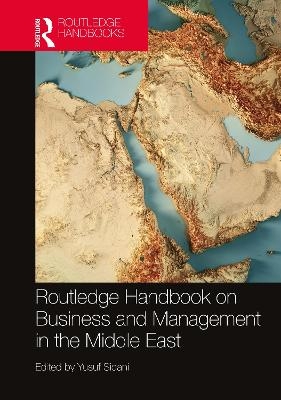
Routledge Handbook on Business and Management in the Middle East
Routledge (Verlag)
978-0-367-49111-6 (ISBN)
This Handbook provides thorough insights into crucial topics that have attracted scholarly and practitioner interest in business and management in the Middle Eastern region.
The chapters of this Handbook open the window on the key areas of discussion in the field over the past few decades, including organizational behavior, leadership, business culture, business ethics, human resources, business strategy, entrepreneurship, finance, and accounting. It starts with identifying five key themes emerging from the variety of topics, locations, and questions addressed by the various authors who contributed to this volume. The remaining 30 chapters tackle various topics of interest to the research and the practitioner: institutional contexts for doing business in the region; issues of leadership, ethics, and organizational behavior; the role of women in leadership and some of the obstacles facing aspirant women leaders; people management and human resources issues in the Middle East; marketing in the Middle East; and strategy and entrepreneurship in the Middle East. The book closes with a reflection on management research in non-Western societies and describes some methodological challenges and propositions.
The Handbook is designed for academics, students, and practitioners covering areas of relevance across business activities, functions, and locations in the Middle East. It is to be used as a reference for scholars doing business research or teaching and for practitioners involved in business activities in the region.
Yusuf Sidani is Dean at the Suliman S. Olayan School of Business, American University of Beirut and Professor of Leadership and Business Ethics. His research focuses on business ethics and international human resource management, with special interest in the Middle East region. His research appeared in leading international peer-reviewed academic journals.
1. Business and Management in MENA Countries Part 1: Institutional Contexts 2. The Impact of the Private Sector on Peace and Security in the Kurdistan Region of Iraq; 3. The Contemporary Context of the UAE Labor Market: An HRM Outlook; 4. Turkey and the Arab World: Public Image, Current Economic Relations, and Business Opportunities and Challenges; 5.Consumer Behavior Changes: The Case of Saudi Arabia Post COVID-19 Part 2: Leadership, Ethics, and Organizational Behavior in the Middle East 6. Theorizing the Phenomenon of Work Engagement in Islam; 7. Egyptian Leadership Character in the Context of Change; 8. Prevalent Business Leadership Styles in the Middle East: An Integrative Review; 9. From Ibn Khaldun to Sharabi: Leadership and Organizational Culture in the Arab Countries - A New Framework; 10. Navigating the Path to Ethical Leadership in the Middle East; 11. Nepotism: Is It a Curse or a Blessing? Dynamics in Arab Culture; 12. International Business Negotiations in the Middle East Part 3: Working Women in the Middle East 13. Women's Leadership in Arab MENA Countries; 14. Women in STEM in the Middle East and North Africa; 15. Increasing Employee Retainment through Mentoring: Careers of Women in STEM in the Middle East and North Africa Part 4: People Management/ HR in the Middle East 16. Business Coaching Industry in Lebanon Market Trends and Opportunities; 17. Strategic Dimensions of Millennial Expatriate Adjustment in the GCC Region; 18. Contextual Factors and Human Resource Development: Implications for Workforce Nationalization in Gulf Cooperation Council (GCC) Countries; 19. Conceptualization of Modern Slavery in a Non-Western Context Part 5: Marketing in the Middle East 20. Employer Branding in the Middle East; 21. A Transformative Marketing for the Future of the Arab World; 22. The Recursive Relationship Between Brand Orientation and Brand Performance in Egyptian SMEs: The Role of Internal Branding; 23. Attitudes toward Anti-Consumption within the Clash of Pessimism and Materialism: A Case of Knowledgeable Actors Part 6: Strategy and Entrepreneurship in the Middle East 24. Philanthropy of Family Firms after a Crisis Event: A Multiple Case Study in Lebanon; 25. A Case Study in Fostering Entrepreneurship and Funding Innovation in Lebanon; 26. The Impact of the COVID-19 Pandemic Crisis on the Financial Performance of Manufacturing Firms: The Case of Egypt; 27. Reflecting on Immigrant Entrepreneurship through the Lens of the Lebanese Diaspora; 28. Importer–Exporter Relationship: An Arab Perspective on Success Factors and Communication Challenges; 29. The Auditing Profession in Egypt: Past, Present, and Future; 30. From Local Players to Global Competitors: Strategies for Scaling Growth in GCC Regional Enterprises Part 7: Research in the Middle East 31. Management Research in Non-Western Societies: Methodological Challenges and Propositions; Index
| Erscheinungsdatum | 23.07.2024 |
|---|---|
| Zusatzinfo | 17 Tables, black and white; 10 Line drawings, black and white; 1 Halftones, black and white; 11 Illustrations, black and white |
| Verlagsort | London |
| Sprache | englisch |
| Maße | 174 x 246 mm |
| Gewicht | 1000 g |
| Themenwelt | Mathematik / Informatik ► Mathematik ► Finanz- / Wirtschaftsmathematik |
| Sozialwissenschaften ► Soziologie ► Spezielle Soziologien | |
| Wirtschaft ► Betriebswirtschaft / Management ► Planung / Organisation | |
| Wirtschaft ► Betriebswirtschaft / Management ► Unternehmensführung / Management | |
| Wirtschaft ► Volkswirtschaftslehre | |
| ISBN-10 | 0-367-49111-7 / 0367491117 |
| ISBN-13 | 978-0-367-49111-6 / 9780367491116 |
| Zustand | Neuware |
| Haben Sie eine Frage zum Produkt? |
aus dem Bereich


